|
|
|
Sort Order |
|
|
|
Items / Page
|
|
|
|
|
|
|
| Srl | Item |
| 1 |
ID:
111643
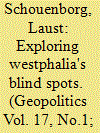

|
|
|
|
|
| Publication |
2012.
|
| Summary/Abstract |
The point of departure for this article is the realisation that the regional dimensions of international society have not been conceptualised adequately by International Relations scholars. One consequence of this, I argue, is that what could have been understood as regionally led change has been framed as revolutionary exceptions or imperialist drives for power aggregation. I attempt to develop this point by demonstrating how, for example, the EU and international fascism (in this article mainly associated with Germany, Italy and Japan during World War II) might instead be considered as cases of regional differentiation within international society. Two things are accomplished via this analysis. First, the cases are 'normalised', making a more accurate historical description of their respective developments possible. Second, by taking these regionally led developments seriously, the potential for fundamental change to the core institutions of international society becomes a distinct possibility and thus unsettles our whole Westphalian imagination.
|
|
|
|
|
|
|
|
|
|
|
|
|
|
|
|
| 2 |
ID:
104035
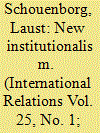

|
|
|
|
|
| Publication |
2011.
|
| Summary/Abstract |
In this article I engage with the theoretical opening provided by Barry Buzan's From International to World Society? I present an argument for five functional categories, which should be able to encompass all the institutions identified by English School scholars throughout history. Their introduction should point the way towards a sounder analytical framework for the study of what Buzan believes should be the new subject of the discipline of International Relations (IR). This subject is defined as second-order societies, meaning societies 'where the members are not individual human beings, but durable collectivities of humans possessed of identities and actor qualities that are more than the sum of their parts', and where the content of these societies, and the key object of analysis, is primary institutions. The purpose of the five functional categories is to break down this 'social whole' and provide a set of lenses through which to potentially analyse international societies throughout history.
|
|
|
|
|
|
|
|
|
|
|
|
|
|
|
|
| 3 |
ID:
178694
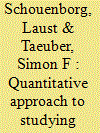

|
|
|
|
|
| Summary/Abstract |
In this article, we aim to contribute to two contemporary debates within the English School. The debate about how to observe primary institutions and the debate concerning hierarchy between primary institutions. Specifically, we analyse references to primary institutions in United Nations General Assembly disarmament resolutions in the decade 1989–1998 and their distribution using descriptive statistics. In this way, the article offers a novel approach to identifying primary institutions empirically, and provides some insight into the hierarchy-question in the sense of documenting the relative numerical presence of references to different primary institutions in a specific issue area and temporal context. With respect to the latter, the key finding is that great power management, diplomacy and international law are by far the most prominent primary institutions in the analysed material. This is an intriguing finding, not least given the importance attached to them by Hedley Bull in his classic work The Anarchical Society: A Study of Order in World Politics. The main contribution of the article is thus to spell out a new approach to how the aforementioned debates might proceed empirically.
|
|
|
|
|
|
|
|
|
|
|
|
|
|
|
|
| 4 |
ID:
142418
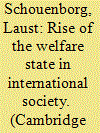

|
|
|
|
|
| Summary/Abstract |
In this article I seek to develop a case for viewing the welfare state as a primary institution in international society. This is with particular reference to Norden (Denmark, Finland, Iceland, Norway and Sweden), where in the course of the 1930s, and particularly in the post-1945 era, the welfare state was elevated to a core principle of legitimacy, largely defining the idea of nationhood for these countries. Furthermore, I will attempt to show how the adoption of this principle of legitimacy conditioned the Nordic countries’ interpretation of a number of other primary institutions in international society such as diplomacy, war and trade. A key contribution of this approach is that it aspires not only to examine the evolution of one institution in isolation, as has often been attempted in English School scholarship, but to actively explore how institutions interact with each other.
|
|
|
|
|
|
|
|
|
|
|
|
|
|
|
|
| 5 |
ID:
145737
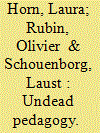

|
|
|
|
|
| Summary/Abstract |
A global zombie outbreak constitutes a hypothetical event in world politics that could likely lead to the collapse of civilization. At the same time, the very threat of such a global catastrophe offers a unique experimental terrain on which to investigate various possible changes and developments in human interaction in social, economic, and political processes. In this article, we discuss our experience with using a global zombie outbreak-based simulation in International Relations teaching and our attempt at measuring the learning outcomes, taking our point of departure in the existing literature on active learning. Following an outline of the objectives, setup, and parameters of the simulation, we evaluate the results of the survey we conducted of the student participants and discuss the learning outcomes discerned.
|
|
|
|
|
|
|
|
|
|
|
|
|
|
|
|
|
|
|
|
|